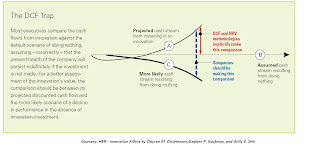It goes like this. When an investment in the field of innovation is made then in the initial year the cash flows are negative for a certain period of time and then it picks up. Of course all the cash flows are projected ones and are hence based on assumptions which might fail. Now, if the investment decision is to be made then the cash flows after investment in new idea is compared with the present cash flows which is assumed to be unchanging in future. This is a trap. This is becasue if nothing is done (i.e. no investment is made) then the future cash flows will not be same as the present ones as the competitors' sustaining and disruptive investments over time will result in price and margin pressure, technology changes, market share losses, sales volume decrease and a decline stock price. So, in actual terms our present cash flows will decline if nothing is done and a status quo is maintained. It is with this declining cash flow that we should compare the future cash flow from the new investment to make decisions. But this is not practiced in general and the trend is to comapre the future cash stream with the present cash streram extrapolated in future. This is Parmenides' Fallacy.

3 comments:
Please get an editor.
Thanks for this. I'm not sure God is purely logical. There's a theme of wacky absurdity that runs through Christian literature - including the Bible: Flaming bushes, ladders to heaven, pigs flying over cliffs, the death of the savior, resurrection, "fools for Christ's sake," etc. So yes God is logical (a tip of the hat to Plato). But he's also damn puzzling — and damn funny at the right moments. Thanks.
BTW, I was referring to the white text above the Parimides commentary. Thanks again for making me think.
Post a Comment